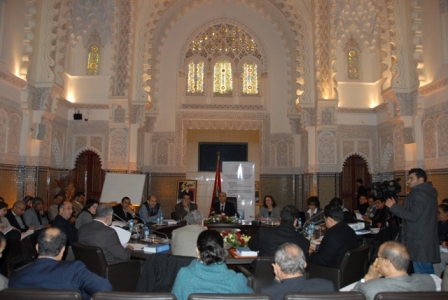THEMATIC MEETING ON HISTORY: SUGGESTIONS TO DEEPEN AND DISSEMINATE KNOWLEDGE ON CONTEMPORARY HISTORY

Under the Follow-up Program of the Equity and Reconciliation Commission’s Recommendations regarding the field of Archives, History and Memory (IER 2), the Advisory Council on Human Rights (CCDH) organized a thematic meeting on “History”, on 23 December 2010, at its headquarters at 9:00 a.m.
Representatives of the government departments concerned, educational and research institutions, universities, nongovernmental organizations, officials of CCDH regional administrative offices and several experts were all invited. During this meeting several proposals were given, including:
- supporting research units and groups on the contemporary history of Morocco and encouraging scientific research in this field;
- exploiting already existing resources, researches, studies, reports and national and international publications (encourage translation of foreign language books to overcome the language obstacle);
- relying on the victims of human rights violations and those who witnessed the events of the contemporary history, who are still alive;
- exploiting literature (prison literature) and traditional songs;
- collecting these works (novels, traditional songs) and researches and studies written about them;
- using image in writing history (documentaries and films);
- collecting all publications on the contemporary history of Morocco;
- relying on non-university publications through the involvement of civil society in writing contemporary history and exploiting relevant press articles;
- including contemporary history in the system of education (for example transitional justice);
- launching a PhD course on contemporary history;
- encouraging experience and expertise exchange within the framework of institutional twining with European Union institutions;
- creating a center of research and documentation to work with national and international researchers;
- conducting a study on political movements during the era of human rights violations;
- creating a communication unit;
- exploiting data and information collected from the examination of the history of the “system of Caids”;
- relying on tribe history and the history of Moroccan countryside in general;
- exploiting national and international archives (mainly France and Spain)
- relying on national and international press articles of the era of violations (mainly Egyptian, Tunisian, Algerian, French and Spanish newspapers). These proposals will be submitted to the scientific committee of the Program for study and approval before being included into the Program’s plan of action.
IER 2 is funded by the European Union and implemented by the Advisory Council on Human Rights. It was officially launched on 25 October 2010. It aims to strengthen the process of democracy and the promotion of human rights. It facilitates the implementation of the Equity and Reconciliation Commission’s recommendations regarding the field of archive preservation, research in history, dissemination of knowledge on the contemporary history of Morocco and preservation of memory.
With a budget of 8 million Euros, the Program includes several activities, mainly: the examination of archives (IER and CCDH), its classification and inventory, creation of an archive institution in Morocco (Archives of Morocco), support operational creation and equipment of the "Archives of Morocco", valorization of the archives of the period of 1956 – 1999, teaching contemporary history, realization of studies and researches, production of communication materials, commemoration of victims’ names, creation of regional museums, creation of a national museum of contemporary history, equipment of museums, etc.






















